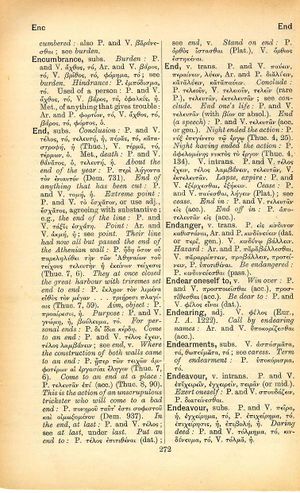end
ἀμβλύς εἰμι καὶ κατηρτυκὼς κακῶν → I'm jaded and with much experience of evils
English > Greek (Woodhouse)
subs.
Conclusion: P. and V. τέλος, τό, τελευτή, ἡ, πέρας, τό, καταστροφή, ἡ (Thuc.), V. τέρμα, τό, τέρμων, ὁ. Met., death: P. and V. θάνατος, ὁ, τελεστή, ἡ. About the end of the year: P. περὶ λήγοντα τὸν ἐνιαυτόν (Dem. 731). End of anything that has been cut: P. and V. τομή, ἡ. Extreme point: P. and V. τὸ ἔσχατος or use adj., ἔσχατος, agreeing with substantive; e. g., the end of the line: P. and V. τάξις ἐσχάτη. Point: Ar. and V. ἀκμή, ἡ; see point. Their line had now all but passed the end of the Athenian wall: P. ἤδη ὅσον οὐ παρεληλύθει τὴν τῶν Ἀθηναίων τοῦ τείχους τελευτὴν ἡ ἐκείνων τείχεσις (Thuc. 7, 6). They at once closed the great harbour with triremes set end to end: P. ἔκλῃον τὸν λιμένα εὐθὺς τὸν μέγαν . . . τριήρεσι πλαγίαις (Thuc. 7, 59). Aim, object: P. προαίρεσις, ἡ. Purpose: P. and V. γνώμη, ἡ, βούλευμα, τό. For personal ends: P. διʼ ἴδια κέρδη. Come to an end: P. and V. τέλος ἔχειν, τέλος λαμβάνειν; see end, v. Where the construction of both walls came to an end: P. ᾗπερ τῶν τειχῶν ἀμφοτέρων αἱ ἐργασίαι ἔληγον (Thuc. 7, 6). Come to an end at a place: P. τελευτᾶν ἐπί (acc.) (Thuc. 8, 90). This is the action of an unscrupulous trickster who will come to a bad end: P. πονηροῦ ταῦτʼ ἐστι σοφιστοῦ καὶ οἰμωξομένου (Dem. 937). In the end, at last: P. and V. τέλος; see at last, under last. Put an end to: P. τέλος ἐπιτιθέναι (dat.); see end v. Stand on end: P. ὀρθὸς ἵστασθαι (Plat.), V. ὄρθιος ἑστηκέναι. v. trans. P. and V. παύειν, περαίνειν, λύειν, Ar. and P. διαλύειν, καταλύειν, καταπαύειν. Conclude: P. τελεοῦν, V. τελειοῦν, τελεῖν (rare P.), τελευτᾶν, ἐκτελευτᾶν; see conclude. End one's life: P. and V. τελευτᾶν (with βίον or absol.). End (a speech): P. and V. τελευτᾶν (acc. or gen.). Night ended the action: P. νύξ ἐπεγένετο τῷ ἔργῳ (Thuc. 4, 25). Night having ended the action: P. ἀφελομένης νυκτὸς τὸ ἔργον (Thuc. 4, 134). V. intrans. P. and V. τέλος ἔχειν, τέλος λαμβάνειν, τελευτᾶν, V. ἐκτελευτᾶν. Lapse, expire: P. and V. ἐξέρχεσθαι, ἐξήκειν. Cease: P. and V. παύεσθαι, λήγειν (Plat.); see cease. End in: P. and V. τελευτᾶν εἰς (acc.). End off in: P. ἀποτελευτᾶν εἰς (acc.).

